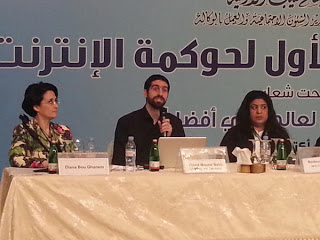A freeflowing discussion about Internet censorship

By Emily Taylor
“Do you think blocking sites will stop our youth accessing them? I don’t think so” said the moderator of the Youth panel. Her question was a response to a comment from one of the panel members, who wanted blocking of some web content, but not of educational sites.
A speaker from the floor advocated digital literacy for parents, rather than Internet censorship, as the best way to keep children safe online, to which the panel member, who had been advocating blocking a moment before, agreed. Another suggested using white lists, rather than blocking. This was countered by “White lists and black lists are a way of ensuring that we don’t advance in the region”.
This discussion about digital freedoms versus online threats could have taken place anywhere in the Western world. For example, Carl Bildt’s opening address at this year’s Stockholm Internet Forum made the same link between development and freedom. The number of Western countries whose governments block access to content, whether for child protection reasons or to minimise digital piracy, is on the increase.
It might come as a surprise to some that this debate took place at the Arab IGF, in the same week when the Saudi government advocated a new body for Internet censorship. In contrast, the range of views expressed at the Arab IGF Youth panel, so close to those we hear in the West, and the support from some government speakers for freedom rather than blocking, conflict with Western preconceptions about the Arab world.
The debate seemed more spiky, and the advocacy for freedom more strident than in many European debates. One participant said “the defender has to block all doors; the attacker only has to find one”. Fady Ramzy’s presentation illustrated this beautifully, showing the reaction of Egyptians to the blocking of Facebook and Twitter in January 2011 – after those doors were closed, people found the open door of HootSuite, and messages volumes went sky high.
Despite the tumultuous events of the past two years in the region, youth speakers were warning against complacency. David Mounir Nabti commented:
“I am afraid where we will be in 10-15 years. I’m worried we are too calm.”
It’s a truism that young people are more open, creative and passionate than their elders – who’ve had all that enthusiasm knocked out of them years ago. This panel emphasised the need for mentoring of young entrepreneurs, the importance of creativity and passion. Their complaints were less about the perceived corrupting force of the Internet, and more about the practical difficulty in finding local suppliers of web services.
A representative from Google tweeted that it was the “first time I see so much openness in the discussion”. Baher Esmat from ICANN summed it up for many when he said “Eldest talk about policies and governance. Youth talk about innovation and creativity – no wonder who gets the Internet right”. Maybe some of us oldies could do with looking at the view from where the younger people are sitting.

